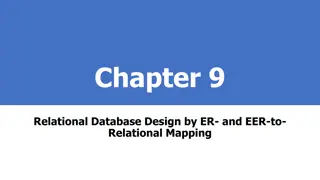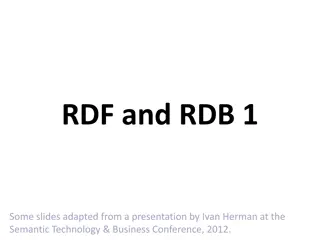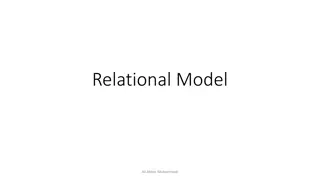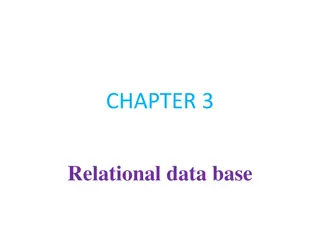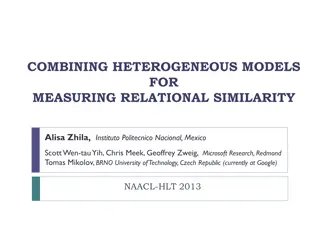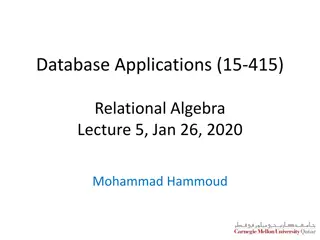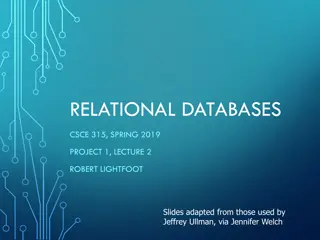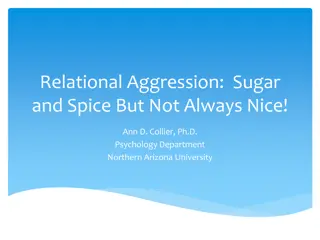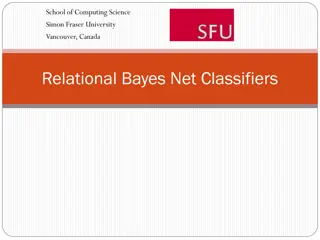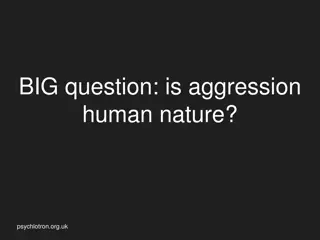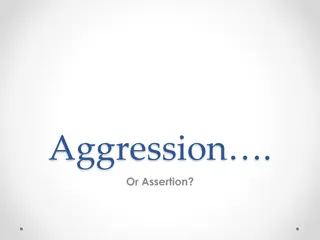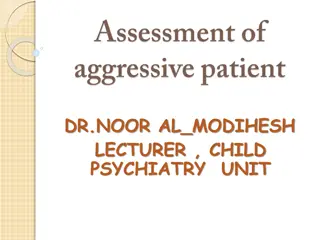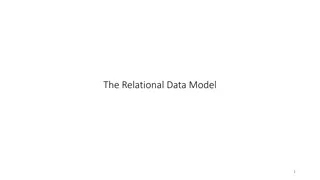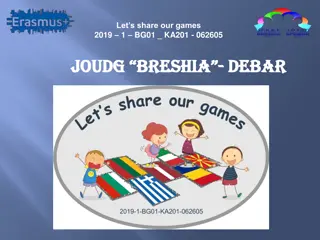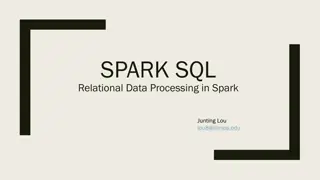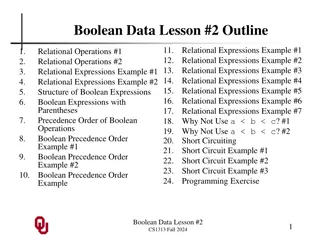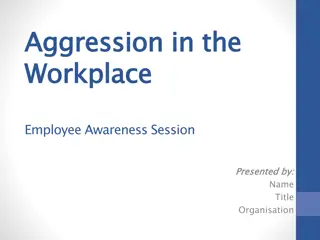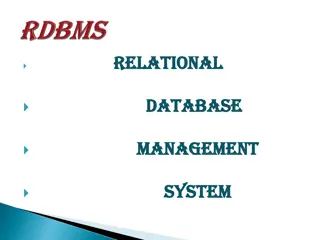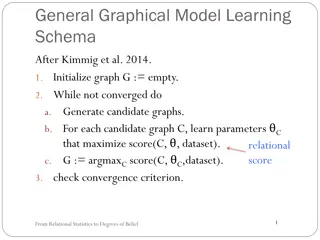Progressive Approach to Relational Entity Resolution
In this research paper authored by Yasser Altowim, Dmitri Kalashnikov, and Sharad Mehrotra, a progressive approach to relational entity resolution is presented. The study focuses on balancing cost and quality in entity resolution tasks for relational datasets. The goal is to develop a method that ac
1 views • 20 slides
Workplace Health and Safety Update - March 2024
The March 2024 update focuses on critical risk statistics, the safety topic of the month which is Aggression and Violence, and highlights the impact of these behaviors on individual and workplace health. It emphasizes the importance of recognizing signs of aggression and violence, de-escalation tech
3 views • 10 slides
Understanding Relational Database Design and Mapping Techniques
Explore the process of mapping Entity-Relationship (ER) and Enhanced Entity-Relationship (EER) models to relational databases. Learn about relational model concepts, mapping algorithms, and the goals and steps involved in the mapping process. Discover how to preserve information, maintain constraint
3 views • 42 slides
Understanding Aggression and Violence: Theories and Influences
Exploring the concept of aggression, this content delves into various theories surrounding aggressive behavior, such as the Biological, Frustration, and Learned Social Behavior perspectives. It also touches on influences on aggression like aversive incidents, arousal, and media influence, while prop
1 views • 45 slides
National Monument Against Violence and Aggression: The Knife Angel in Blackburn Cathedral
Explore the reasons why people carry knives, the Lancashire statistics on knife crime, the strict laws regarding knife possession, and illegal blades to raise awareness and promote a safer community. The Knife Angel exhibit at Blackburn Cathedral emphasizes the impact of violence and aggression. It
0 views • 14 slides
Understanding Aggression: Causes and Solutions
Aggression is any intentional behavior aimed at harming others, whether physically, verbally, or emotionally. It can be instrumental or hostile. Biological factors like hormones and neural substrates, social/cultural factors such as frustration and provocation, and environmental/situational factors
0 views • 10 slides
Indo-Pacific Crisis: Managing Chinese Aggression in 2028
In January 2028, a maritime standoff between China and the Philippines escalates, leading to cyber-attacks, social unrest, and military clashes. By February, the Indo-Pacific Command activates JTF 77 to counter Chinese aggression in the region, focusing on limited military objectives. Amidst escalat
1 views • 10 slides
Understanding Enduring Relational Themes in Psychotherapy
Exploring the concept of Enduring Relational Themes (ERTs) in psychotherapy, this content delves into the history of transference in Gestalt therapy, contemporary psychoanalysis perspectives, forms of transference, and Lynne Jacobs' insights. It highlights how ERTs manifest, their impact on therapy,
5 views • 9 slides
Exporting Relational Data to RDF: Strategies and Considerations
Explore the process of mapping relational data to RDF, including the choice of RDF vocabulary, defining mapping techniques, and exporting strategies. Learn about RDB systems that support RDF, direct mapping approaches, and the use of hybrid storage solutions. Discover how to bridge SPARQL and SQL fo
1 views • 13 slides
Understanding the Key Concepts of Relational Databases
Introduction to the fundamental concepts of relational databases including the relational model proposed by Edgar F. Codd, relation schemes, relation instances, keys for a relation, and more. Discover the significance of keys, candidate keys, superkeys, and primary keys in database design.
0 views • 27 slides
Understanding Relational Databases and File-Based Systems
This chapter delves into the fundamental concepts of databases, comparing them to file-based systems, and highlighting the significance of relational databases in modern integrated AISs. It explores the difference between logical and physical views of databases, introduces key concepts such as DBMS
0 views • 70 slides
Enhancing Relational Similarity Measurements: A Model Combination Approach
This study explores combining heterogeneous models for measuring relational similarity, showcasing the importance of general relational similarity models. It discusses the degrees of relational similarity and introduces a directional similarity model that outperforms previous systems. The approach l
0 views • 23 slides
Reactor: A Case for Predictable, Virtualized Actor Database Systems
Exploring the integration of actor programming models in modern relational databases to achieve high performance. The focus is on addressing challenges related to stored procedures, data partitioning, modularity, isolation, software engineering, and performance. The talk outlines motivation, the rel
0 views • 41 slides
Understanding Relational Query Languages in Database Applications
In this lecture, Mohammad Hammoud discusses the importance of relational query languages (QLs) in manipulating and retrieving data in databases. He covers the strong formal foundation of QLs, their distinction from programming languages, and their effectiveness for accessing large datasets. The sess
0 views • 39 slides
Challenges and Innovations in Relational Engine Algorithms
Exploring the complexity of processing graph data in relational query engines, this content delves into the challenges faced, practices adopted in academia, and innovative solutions like LMS-NPRR, trie join, and specialized data structures. It discusses the difficulties in handling acyclic vs. cycli
0 views • 27 slides
Understanding Relational Evangelism and Sharing Your Faith Testimony
Discover the essence of relational evangelism and effectively articulating your testimony of faith. Explore the significance of the Gospel message and different evangelistic approaches while delving into the concept of personal evangelism without imposition. Embrace the idea of faith arising in vari
0 views • 32 slides
Fundamentals of Relational Databases in CSCE 315 - Lecture Highlights
Introduction to relational databases covering topics such as relational data model, schemas, converting from entity-relationship model, entity sets, relations, relationships, combining relations, and practical examples. Learn about storing data in tables, attributes, database organization, and the i
1 views • 18 slides
Understanding Aggression: The Intersection of Theories and Applications in Violence Reduction
Exploring the multifaceted nature of aggression, this content delves into theories of violence, effects of trauma, current treatment approaches, and the future of using Eye Movement Desensitization and Reprocessing (EMDR) in reducing aggression. From defining aggression to examining early theories,
0 views • 64 slides
Tracing Verbal Aggression and Facework Strategies Over Time
Dawn Archer and Bethan Malory explore the tracing of verbal aggression and other facework strategies over time using themes from the Historical Thesaurus of English. They utilize automated content analysis tools to analyze datasets from various historical periods and propose solutions for prioritizi
0 views • 41 slides
Understanding Relational Aggression in Girls: The Impact on Social Relationships
Relational aggression, a form of social bullying, can have detrimental effects on girls' social relationships and self-esteem. This type of indirect aggression includes behaviors like exclusion, spreading rumors, and social manipulation. Understanding and assessing relational aggression is crucial f
0 views • 22 slides
Enhancing Spatial Data Analysis in QGIS
Explore the integration of relational databases with QGIS to facilitate efficient spatial data analysis. Discover the importance of recognizing spatial relationships within data sets and the solutions to enhance QGIS for relational datasets. Overcome challenges and delve into the intersection and su
0 views • 25 slides
Understanding Relational Bayesian Networks in Statistical Inference
Relational Bayesian networks play a crucial role in predicting ground facts and frequencies in complex relational data. Through first-order and ground probabilities, these networks provide insights into individual cases and categories. Learning Bayesian networks for such data involves exploring diff
0 views • 46 slides
Understanding Aggression: Exploring Its Evolutionary Roots
Delve into the complexities of human aggression, questioning whether it is inherent or a learned behavior. Explore evolutionary theories and biological perspectives on the causes of aggression, examining how factors such as genetics, brain structures, hormones, and environmental pressures may influe
0 views • 11 slides
Understanding the Dynamics of Aggression and Assertion in Competitive Environments
Aggression is intentional behavior aimed at harming others, while assertion is forceful yet non-harmful conduct within the spirit of competition. Factors like antecedents, perceived unfairness, and pressure to win can trigger aggression in sports. Recognizing the differences between hostile and chan
0 views • 10 slides
Addressing Challenges in Community Rights and Development Aggression
The problem highlighted is the improper lensing of rights in communities, leading to aggression and knowledge gaps. Communities often do not engage due to cultural differences, political pressure, or corrupt practices. There is a lack of transparency and information availability in development proje
0 views • 6 slides
Understanding Cat Aggression and How to Deal with It
Cat aggression towards humans can stem from various reasons such as fear, handling issues, play-related behaviors, pregnancy, pain, or redirected aggression. This behavior can vary among different cat breeds. Recognizing the triggers and responding appropriately is essential to manage and prevent ca
1 views • 9 slides
Understanding the Nature vs. Nurture Debate in Aggressive Behavior
Aggression is a prevalent issue in society, with factors like biology (testosterone levels, genetics) and environment (parental influence, exposure to violence) playing crucial roles. The debate on whether aggression stems from nature or nurture is explored through various perspectives, such as etho
0 views • 35 slides
Understanding Agitation and Aggression in Psychiatric Patients
Agitation is a tension state characterized by anxiety and hyperactivity seen in depression, schizophrenia, and mania, while aggression involves hostile thoughts or actions towards others, common in impulse control disorders. Psychiatric patients are usually not aggressive, but certain mental illness
0 views • 16 slides
Understanding the Difference Between Aggression and Agitation in Psychiatry
Aggression involves verbal or physical attacks, while agitation is a state of mental disturbance leading to physical restlessness and increased arousal. Both can be common presentations in psychiatric emergencies with various risk factors and management strategies involved, including verbal communic
0 views • 14 slides
Insights into Aggression: Causes, Gender Differences, and Influencing Factors
Aggression is intentional behavior aimed at causing harm, with instrumental and hostile forms. Gender differences show males are more physically aggressive, while females engage in relational aggression. Aggression is influenced by situational and cultural factors, with influences from alcohol. Unde
0 views • 31 slides
Understanding the Relational Data Model and Database Concepts
Delve into the world of relational data modeling, database integrity rules, and structure. Explore how a university database in MS Access utilizes relational tables and fields to store information. Learn about the key terminology associated with relational databases, such as primary keys, foreign ke
0 views • 69 slides
Women's Self-Esteem and Relationship Behavior Study: Insights and Implications
This study explores the relationship between women's self-esteem, relational behavior, and perceptions of relational desirability. Findings indicate that self-esteem does not significantly predict relational behavior, with women feeling less desirable than their partners reported investing more in r
0 views • 9 slides
Understanding Relational Child and Adolescent Psychotherapy
Explore the concepts of relational child and adolescent psychotherapy involving attachment patterns, intersubjectivity, corrective emotional experiences, and the role of the relational psychodynamic psychotherapist in providing corrective emotional experiences essential for the child's development.
0 views • 25 slides
How Sports Help with Aggression: Let's Share Our Games 2019
Understanding aggression and its different types is crucial in addressing harmful behaviors. Engaging in sports activities, such as basketball, soccer, and martial arts, has been shown to reduce aggression by promoting self-control skills and channeling negative emotions into physical activity. Team
0 views • 9 slides
Overview of Spark SQL: A Revolutionary Approach to Relational Data Processing
Spark SQL revolutionized relational data processing by tightly integrating relational and procedural paradigms through its declarative DataFrame API. It introduced the Catalyst optimizer, making it easier to add data sources and optimization rules. Previous attempts with MapReduce, Pig, Hive, and Dr
0 views • 29 slides
Understanding Relational Operations for Boolean Expressions
Learn about relational operations in Boolean expressions through examples and explanations. Discover how to compare numeric operands to produce Boolean results, covering equal to, not equal to, less than, less than or equal to, greater than, and greater than or equal to operations. The content inclu
0 views • 25 slides
Workplace Aggression Awareness Session: Understanding and Prevention
This employee awareness session sheds light on workplace aggression, its definition, effects, sources, and management. It outlines employer and employee responsibilities, current control measures, and provides training objectives to enhance awareness and prevent harm. Additionally, it emphasizes the
0 views • 32 slides
Evolution of Database Management Systems
The evolution of Database Management Systems (DBMS) began with file systems and punched cards in the 1950s, followed by hierarchical and network models in the 1960s and 1970s. The 1980s introduced relational databases like Ingres, Oracle, DB2, and Sybase. The 1990s saw the rise of object-oriented an
0 views • 31 slides
Learning Bayesian Network Models from Complex Relational Data
Delve into the process of learning Bayesian network models from complex relational data, extending traditional algorithms to suit relational data structures. Explore key concepts like likelihood functions, graphical model initialization, and parameter learning for effective model fitting.
0 views • 20 slides
Introduction to Relational Calculus and Algebra in Database Management
Explore the fundamental concepts of relational calculus and algebra in the domain of database management. Understand the differences between declarative and imperative query languages and learn to retrieve information using practical examples and theoretical frameworks such as tuple relational calcu
0 views • 23 slides


